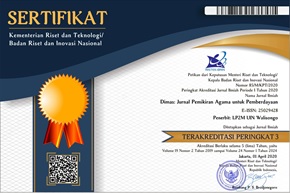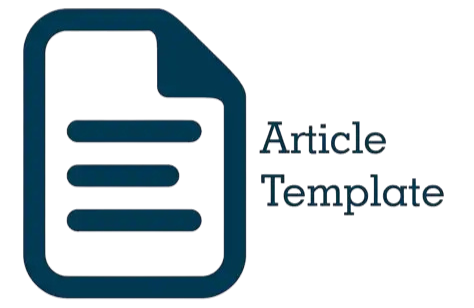Urgensi Literasi Digital bagi Pendidik dalam Meningkatkan Keterampilan Mengelola Pembelajaran
DOI:
https://doi.org/10.21580/dms.2022.221.10042Keywords:
urgency, educator, digital literacy, learning skillAbstract
The spread of the Covid-19 virus requires human interaction to be mediated by information and communication technology, including education. Educators must adapt to this change to become role models quickly. However, not all educators can use technology in online learning. For educators in the village who had never used information and communication technology for education, this adaptation process needed guidance in the acceleration, as a necessity of educators with ICT mastery capabilities in the information age and amid the pandemic situation. It takes a mentoring program for educators to improve their ability and competence on digital technology for learning management both luring and online. This program is intended for educators in MI Al-Hikmah Source of Simo Boyolali through a participatory approach. The training began by doing a pretest and continued FGD to map the potential and problems faced by the teacher. Based on the pretest and FGD, we decided to conduct digital literacy training to improve educator competencies in managing online learning and luring.
Penyebaran virus Covid-19 mengharuskan interaksi manusia termediasi oleh teknologi informasi dan komunikasi termasuk dalam bidang pendidikan. Pendidik dituntut untuk beradaptasi dengan cepat terhadap perubahan ini agar tetap mampu menjadi role model. Namun demikian belum semua pendidik mampu memanfaatkan teknologi dalam pembelajaran daring. Bagi pendidik yang berada di desa yang sebelumnya tidak pernah menggunakan teknologi informasi dan komunikasi untuk pembelajaran, bimbingan dalam percepatan proses adaptasi ini perlu dilakukan. Sebagai sebuah keniscayaan pendidik dengan kemampuan penguasaan TIK di era informasi dan ditengah situasi pandemic. Dibutuhkan program pendampingan bagi pendidik untuk meningkatkan kemampuan dan kompetensi pendidik terhadap pemanfaatan teknologi digital untuk pengelolaan pembelajaran baik luring maupun daring. Program ini ditujukan untuk pendidik di MI Al Hikmah Sumber Simo Boyolali melalui pendekatan partisipatoris. Pelatihan dimulai dengan melakukan pretes dan dilanjutkan FGD untuk memetakan potensi dan masalah yang dihadapai guru. Berdasarkan hasil pretest dan FGD kemudian diputuskan untuk melakukan pelatihan literasi digital untuk meningkatkan kompetensi pendidik dalam mengelola pembelajaran daring dan luring
Kata kunci: Urgensi; Literasi Digital; Keterampilan; Pendidik; Pembelajaran
Downloads
References
Barton, Georgina, and Gary Woolley. 2018. “Digital Literacies.” Developing Literacy in the Secondary Classroom, 170–86. https://doi.org/10.4135/9781526415417.n11.
Bayne, Siân, and Jen Ross. 2007. “The ‘digital Native’ and ‘Digital Immigrant’: A Dangerous Opposition.” Annual Conference of the Society for Research into Higher Education, 1–6. https://doi.org/10.1111/j.1574-695X.1996.tb00232.x.
Celot, Paolo, and José Manuel Pérez Tornero. 2009. “Study on Assessment Criteria for Media Literacy Levels: A Comprehensive View of the Concept of Media Literacy and an Understanding of How Media Literacy Levels in Europe Should Be Assessed.” European Association for Viewers’ Interests, no. October: 1–92.
Heidegger, Martin. 1977. The Question Concerning Technology and Other Essays. Technology and Values: Essential Readings. https://doi.org/10.1007/BF01252376.
Kim, Joohan. 2016. “Phenomenology of Digital-Being Author ( s ): Joohan Kim Source : Human Studies , Vol . 24 , No . 1 / 2 , Intertexts : Philosophy , Literature and the Human Sciences in Korea ( 2001 ), Pp . 87-111 Published by : Springer Stable URL : Http://Www.Jstor.Org/S” 24, no. 1: 87–111.
Komang Sujendra Diputra, Ni Ketut Desia Tristiantari, I Nyoman Laba Jayanta. 2020. “Gerakan Literasi Digital Bagi Guru-Guru Sekolah Dasar.” Journal of Character Education Society 3, no. 1: 118–28. https://doi.org/https://doi.org/10.31764/jces.v3i1.1483.
Kumalasani, Maharani Putri. 2020. “Implementasi Literasi Digital Guru SD Melalui Pendampingan Pembuatan Digital Material ( Sway )” 3, no. 1: 21–30.
Madigan, Martin & D. 2006. “Digital Fusion: Defi Ning the Intersection of Content and Communications.” Digital Literacies for Learning, 42–50.
Madrah, Muna Yastuti, and Ahmad Muflihin. 2017. “PHENOMENOLOGY OF DIGITAL CULTURE IN THE EDUCATIONAL AREA An Epistemological Review” 11, no. 1: 51–66.
Nasrullah, Rullie, Wahyu Aditya, Tri Indira Satya, Meyda Noorthertya Nento, Nur Hanifah, Miftahussururi, and Qori Syahriana Akbari. 2017. “Materi Pendukung Literasi Digital: Gerakan Literasi Nasional.” Kementerian Pendidikan Dan Kebudayaan, 33.
Palfrey, John, and Urs Gasser. 2008. “Born Digital: Understanding the First Generation of Digital Natives.” Hedgehog Review 198, no. 2008: 288. https://doi.org/10.1097/NMD.0b013e3181cc549e.
Pangrazio, Luci, Anna-Lena Godhe, and Alejo González López Ledesma. 2020. “What Is Digital Literacy? A Comparative Review of Publications across Three Language Contexts.” E-Learning and Digital Media 17, no. 6: 442–59. https://doi.org/10.1177/2042753020946291.
Pemerintah Desa Sumber. 2021. Data Desa Sumber. Sumber, Simo, Boyolali: Pemerintah Desa Sumber.
Roblyer, M D, and Gerald A Knezek. 2003. “New Millennium Research for Educational Technology: A Call for a National Research Agenda.” Journal of Research on Technology in Education 36, no. 1: 60–71. http://coe.nevada.edu/nstrudler/RoblyerKnezek.pdf.
Thompson, Ann D. 2005. “Scientifically Based Research: Establishing a Research Agenda For The Technology in Teacher Education Community.” Journal of Research on Technology in Education (International Society for Technology in Education) 37, no. 4: 331–37. http://search.ebscohost.com/login.aspx?direct=true%7B&%7Ddb=bth%7B&%7DAN=18566790%7B&%7Dsite=ehost-live.
Wang, Qian, Michael D. Myers, and David Sundaram. 2013. “Digital Natives and Digital Immigrants: Towards a Model of Digital Fluency.” Business and Information Systems Engineering 5, no. 6: 409–19. https://doi.org/10.1007/s12599-013-0296-y.
Downloads
Published
Issue
Section
License
Copyright
The copyright of the received article shall be assigned to the journal as the publisher of the journal. The intended copyright includes the right to publish the article in various forms (including reprints). The journal maintains the publishing rights to the published articles. Therefore, the author must submit a statement of the Copyright Transfer Agreement.*)
Licensing

This work is licensed under a Creative Commons Attribution-ShareAlike 4.0 International License.
In line with the license, authors are allowed to share and adapt the material. In addition, the material must be given appropriate credit, provided with a link to the license, and indicated if changes were made. If authors remix, transform or build upon the material, authors must distribute their contributions under the same license as the original.
_______
*) Authors whose articles are accepted for publication will receive confirmation via email and send a Copyright Transfer Agreement.









